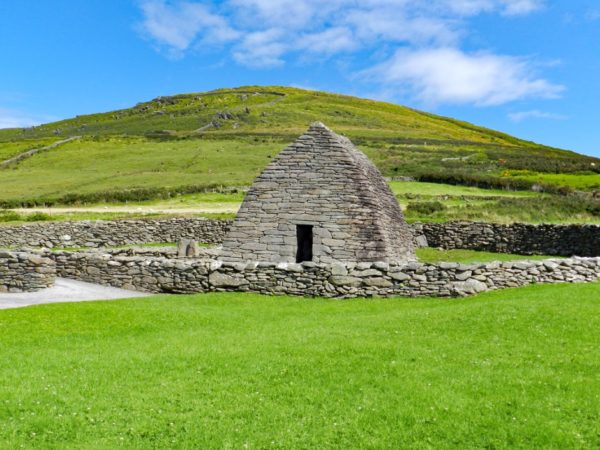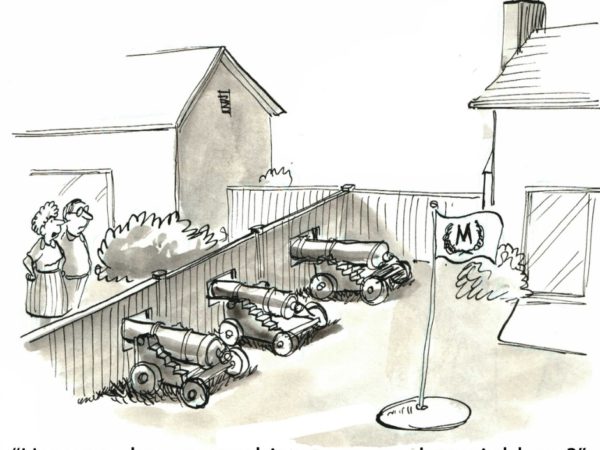The first step of humility, then, is that a man keeps the fear of God always before his eyes and never forgets it. Psalm 36:1 (Rule of St. Benedict 7.10)
The practice of humility isn’t so daunting once you realize that it’s not about what other people think of you. It’s about your existence.
The first step in this practice is elemental. Over and over in Scripture, the fear of God is recommended to us as beneficial to our well-being:
Happy is everyone who fears the Lord, who walks in his ways.
You shall eat the fruit of the labor of your hands; you shall be happy, and it shall go well with you.
Your wife will be like a fruitful vine within your house; your children will be like olive shoots around your table.
Thus shall the man be blessed who fears the Lord. Psalm 128:1-4
Immediately it becomes clear that if your idea of happiness is winning the jackpot in Vegas, you’ve got the wrong God here. The God of Abraham, Isaac, Jacob, the psalmists and prophets, St. Benedict and all the saints of the Church will bless you with a domestic life and a living wage. God’s idea of happiness for his favorite creatures is not idleness, but satisfying work; not luxury, but abundance; not sexual adventures, but family.
That’s the carrot. But in case the carrot doesn’t motivate you, there’s also a stick. When St. Benedict echoes the psalmist in proclaiming the fear of the Lord, he’s not talking about an intellectual assent to a coherent philosophical proposition. He stands with all the other prophets in proclaiming that God is a Person. And this Person holds each human being accountable for every free action. God will punish those who willfully disobey his commands. God will reward those who attempt to obey him. Both the punishment and the reward will endure forever, once we’ve completed our journey through time. So it is scary. You’re supposed to feel a thrill of terror.
But as always in this religion, there’s a paradox. For those who don’t deserve much of anything, there is infinite mercy, if you’re humble enough to accept mercy.
The fear of the Lord is a fountain of life Proverbs 14:27
The metaphor evokes fresh water in the desert. On barren cliffs green things flourish. How can this be? A seed drifting on the wind lodged in a crack and sensed that it was time to send forth a tiny root. Just so, the fear of the Lord is the mysterious spiritual sense that God endows his creatures with, enabling them to recognize his presence and to turn to him as the source of their vitality.
Does it have to be fear? Fear isn’t nice. We’ve edited it out of religion. But then again, we’ll pay money to feel it in a horror flick or on a roller coaster. If it’s so bad, why do nice people seek it out and pay for it?
Because we are alive. Only living creatures can feel fear. When we feel fear, we also feel alive, because we’re viscerally aware of a threat to our existence.
The barren rock that never lived cannot fear losing the life it never had. And people who’ve never felt alive can’t fear the loss of what they’ve never known. They become indifferent to annihilation, their own and other people’s. In interactions with others, these petrified souls exhibit a delusion of impunity. Their moral indifference extends from their spiritual aridity. They’re untouchable, or so they imagine. This is not a sign of progress or of superiority. It’s a sign of something missing.
The fear of God is the first step of humility, because humility is the root that aligns us in the proper posture with respect to our creator, so that we’re able to draw life from him. We recognize our dependence on the one who called us into being. We acknowledge the presence of the one who sustains everything at every moment. And we send out at first just a tiny filament towards him, but as we grow and thrive, this will become a tough root mass that attaches us firmly to the region of our life source.
What about the trouble that comes to everyone? The trouble you face in this world is not the punishment of God. The trouble you face now is what you have to get through on the way to your reward. Now is the struggle of life in the desert. Later is the rest at the oasis.
St. Paul tells us that even if everything in the universe conspires against us–death, life, angels, demons, the present, the future, nature, culture, hurricanes, floods–God is still on our side, through it all, as long as we’re trying to do the right thing (Romans 8: 1-39). Our struggle toward goodness through harsh surroundings shows that we are vital after all.




